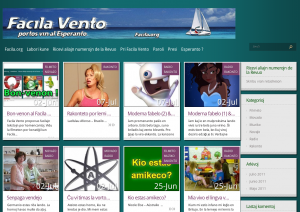Facila Vento – easy reading in Esperanto Posted by Chuck Smith on Aug 2, 2011 in Uncategorized
I know, you’re just starting to learn Esperanto or perhaps you know someone else just getting started. There’s a ton of stuff to read online, but it all feels a bit too difficult. Facila Vento is a new site producing new easy-to-read Esperanto texts to help beginners get comfortable in the language. The name “facila vento” comes from the first verse of the Esperanto anthem La Espero En la mondon venis nova sento, tra la mondo iras forta voko; per flugiloj de facila vento nun de loko flugu ĝi al loko. (Into the world came a new feeling, through the world goes a powerful call; by means of wings of a gentle wind now let it fly from place to place.) In other words, Esperanto came and spread around the world like a gentle wind.
Facila Vento has text ranging from stories to news and also about the Esperanto movement. Most of these are also accompanied by spoken text read slowly, so that beginners can easily understand them. For example, I’ve already read and listened to stories there about a senpaga vendejo (free store), a story of a Brit who thought she could speak Danish well until she worked with children in a day care center and a story about La ĉokolada kuketo (the small chocolate cake).
All content on the site only uses the 700 most frequently used Esperanto root words as agreed upon in the Baza Radikaro Oficiala by the Akademio de Esperanto. Some texts are originally written for Facila Vento while others are made easier from already existing texts. When they are made easier, links are given to the original when possible, so that readers can also try their hand at reading the ordinarily difficult text with the help of already knowing the story.
Here is an excerpt from the story about free stores:
En tiuj vendejoj oni povas kunpreni ĉiujn eblajn objektojn, kiel ekzemple vestojn, librojn, ludo-objektojn, radiojn aŭ ilojn. Oni ankaŭ povas alporti objektojn, kiuj ankoraŭ estas uzeblaj. La homoj, kiuj kreis tiujn vendejojn laboras sen ricevi pagon. Kompreneble tia komerco ne povas ekzisti sen mono. Oni devas pagi por la uzo de la loko kaj por la elektro. Do, la “aĉetantoj” helpas per malgrandaj donacoj.
This project consists of a team of 16 editors and 6 people to handle the technical side. Their goal was to help beginners to not be frustrated reading Esperanto. This way more people can already start reading while they’re still beginners and still very enthusiastic about the language. To help you stay interested, you can sign up to receive a new story each week. This helps you regularly practice the language, so it doesn’t just fall by the wayside amongst all the daily tasks. What do you think of Facila Vento?

Build vocabulary, practice pronunciation, and more with Transparent Language Online. Available anytime, anywhere, on any device.
About the Author: Chuck Smith
I was born in the US, but Esperanto has led me all over the world. I started teaching myself Esperanto on a whim in 2001, not knowing how it would change my life. The timing couldn’t have been better; around that same time I discovered Wikipedia in it’s very early stages and launched the Esperanto version. When I decided to backpack through Europe, I found Esperanto speakers to host me. These connections led me to the Esperanto Youth Organization in Rotterdam, where I worked for a year, using Esperanto as my primary language. Though in recent years I’ve moved on to other endeavors like iOS development, I remain deeply engrained in the Esperanto community, and love keeping you informed of the latest news. The best thing that came from learning Esperanto has been the opportunity to connect with fellow speakers around the globe, so feel free to join in the conversation with a comment! I am now the founder and CTO of the social app Amikumu.





Comments:
Paŭlo:
I think “most important roots” would be more fitting than “most frequently used”. (Importance you can decree, usage you can only measure.)
Inmyidealworld:
I really like the Facila Vento site. Great idea. I’m learning and practising a lot.
Mateo B.:
Fantastic idea. It was just this morning I was looking for something to read in esperanto that would not be too advanced but could help keep my interest. Then I stumbled upon a link to this article in Google Sparks. Exactly what I wanted.
I may offer help to provide e-pub version of the texts as well (PDF is nice, but true ebook formats generally easier to deal with).
Paulo D:
many thanks
great for my mature age students at U3A studying at whyalla university, south australia. to teach kids at a later date (soon?)they want to learn the niceties and the basics in preparation for a big change
in the language order status quo, perhaps at the end of the american empire
Alexei Boronine:
Another website with a similar goal (with built-in dictionary): http://www.libraro.net
DAVID SMITH:
Like the idea of that libraro site, just too many “not founds” when looking up words. I’m on day 3 of learning esperanto. perhaps it will be better to use that page as i progress.
Katie:
Mi amas multe ĝi ideo! Hieraŭ, mi volis multe Esperanton per legi. Multe dankon! (:
Enrique:
Readings, books, podcasts with text, for beginners and all levels:
http://esperantofre.com/edu/libroja.htm